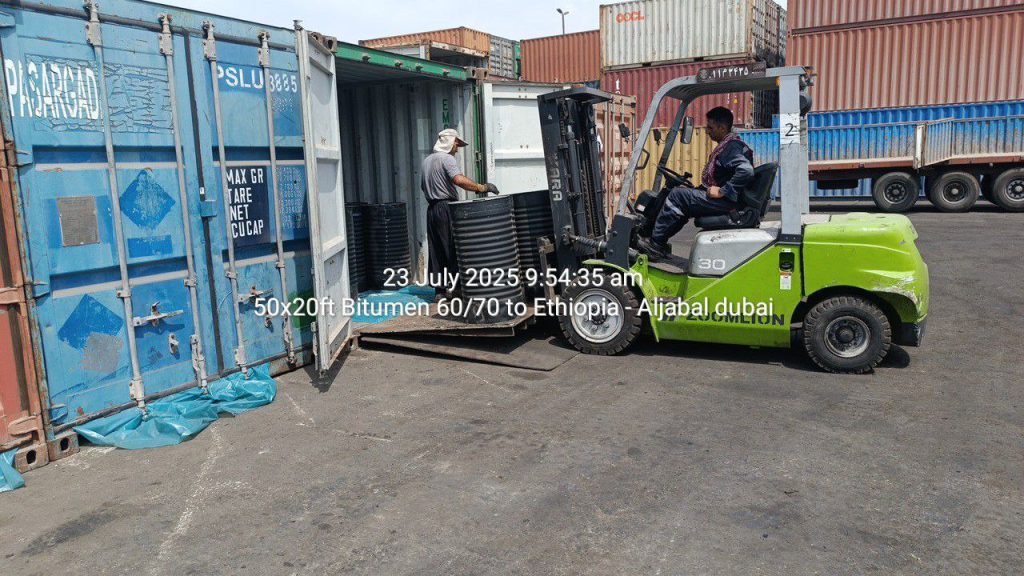
Introduction
Bitumen might not be the flashiest of materials, but it’s absolutely vital to the infrastructure that powers our modern world. Roads, highways, and even airport runways rely on high-quality bitumen to ensure durability and performance under extreme conditions. And when a company successfully exports a massive shipment of this black gold, it’s more than just a transaction—it’s a key development in the construction and logistics sectors.
In July 2025, Aljabal Holding marked a significant milestone by exporting 50 containers (20ft each) of Bitumen 60/70 to Ethiopia, a country that’s rapidly accelerating its infrastructure expansion. This move highlights both the growing demand for bitumen in East Africa and Aljabal Holding’s strategic role in the region’s development landscape.
The scale of this shipment is a strong indicator of rising infrastructure investment and economic progress in Ethiopia. With urbanization pushing the boundaries of its cities and the government prioritizing major road projects, the demand for quality bitumen is on the rise. This article dives deep into who Aljabal Holding is, the specifics of Bitumen 60/70, why Ethiopia is a growing market, and what this July 2025 export means for the future.
Who is Aljabal Holding?
Aljabal Holding isn’t just a name in the global trade directory—it’s a powerhouse when it comes to petroleum product exports, especially bitumen, a product they have mastered both in terms of sourcing and delivery. With headquarters rooted in the Middle East and an international footprint, the company has built its reputation on reliability, quality, and strategic logistics management.
The company deals extensively in various grades of bitumen, fuel oils, and petrochemicals. Their clientele spans several continents, and their reputation is built on meeting tight deadlines, offering consistent product quality, and supporting large-scale infrastructure projects.
What sets Aljabal Holding apart is their logistical expertise and strong supplier relationships, which enable them to deliver large shipments such as the 50x20ft containers dispatched to Ethiopia this past July. Their supply chain is robust, often integrating partnerships with refineries, transport companies, and governmental authorities to ensure seamless delivery even to landlocked nations like Ethiopia.
Additionally, Aljabal Holding has been actively focusing on the East African market, recognizing the untapped potential in countries like Ethiopia, Kenya, Uganda, and Tanzania. Their goal? To be the go-to partner for all petroleum and bitumen-related needs in the region.
What is Bitumen 60/70?
Bitumen 60/70 is the most commonly used grade of bitumen for road construction across many regions, including Africa and Asia. It’s a penetration-grade bitumen, which means its hardness is measured by how far a standard needle penetrates it under specific conditions (in this case, between 60 and 70 tenths of a millimeter at 25°C).
But what makes Bitumen 60/70 so essential?
- Durability: It holds up against heavy loads and varying weather conditions, which makes it ideal for road construction.
- Versatility: It can be used in both hot climates (like Ethiopia) and temperate zones without rapid degradation.
- Workability: Easy to mix with aggregates and apply in construction processes.
Here are a few common applications:
- Road surfacing and asphalt production
- Pavement repairs
- Waterproofing and sealing applications in buildings
- Airport runways and industrial flooring
Aljabal Holding’s decision to ship this grade of bitumen to Ethiopia wasn’t random—it aligns perfectly with Ethiopia’s current infrastructure requirements, especially with the number of highways and inter-city roads currently under development.
Moreover, the 60/70 grade is also compliant with international quality standards, ensuring safety, longevity, and cost-efficiency for large government and private sector projects.
Ethiopia’s Demand for Bitumen
Ethiopia is undergoing a massive transformation. From the bustling streets of Addis Ababa to emerging economic hubs across the country, there’s an unmistakable push for better roads, logistics networks, and transportation systems. Behind much of this development is bitumen—the key ingredient that makes roads durable and reliable.
In recent years, Ethiopia has launched several road construction projects, including:
- Expressways linking major cities
- Rural road upgrades
- Ring roads in urban centers
- Cross-border transport corridors with neighboring countries
All these projects have created a spike in the demand for high-grade bitumen like 60/70.
According to Ethiopian government data and development reports, the country needs over 150,000 tons of bitumen annually to meet its construction goals. Unfortunately, local production is minimal, and thus, the country relies heavily on imports from key global suppliers—enter Aljabal Holding.
Besides roads, bitumen is also used in Ethiopia for:
- Roofing solutions
- Dams and irrigation infrastructure
- Waterproofing in urban buildings
This high and diverse demand ensures that suppliers who can consistently deliver quality product—on time—are in a prime position to lead the market.
July 2025 Export Milestone
July 2025 was a big month for Aljabal Holding. The company successfully executed the export of 50 containers of bitumen 60/70, each measuring 20 feet, to Ethiopia. This isn’t just a matter of shipping a large number of drums or barrels—it’s a well-coordinated logistical effort involving:
- Bulk packaging for long-haul transport
- Customs clearance
- Land transportation from port to inland Ethiopian destinations
- Quality inspection at each stage
Each container was packed with carefully processed, high-quality bitumen, conforming to international specifications and ensuring maximum performance upon arrival.
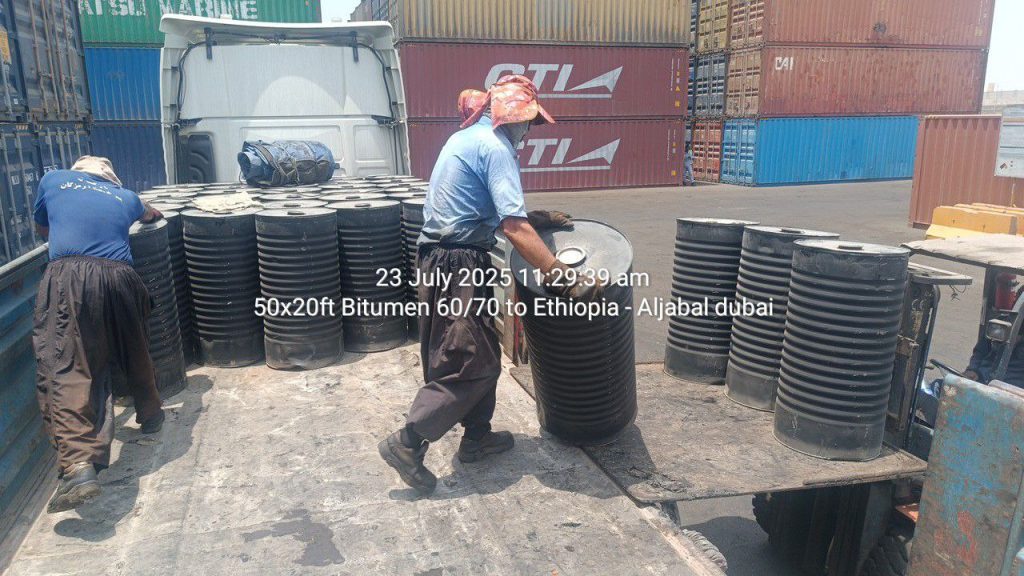
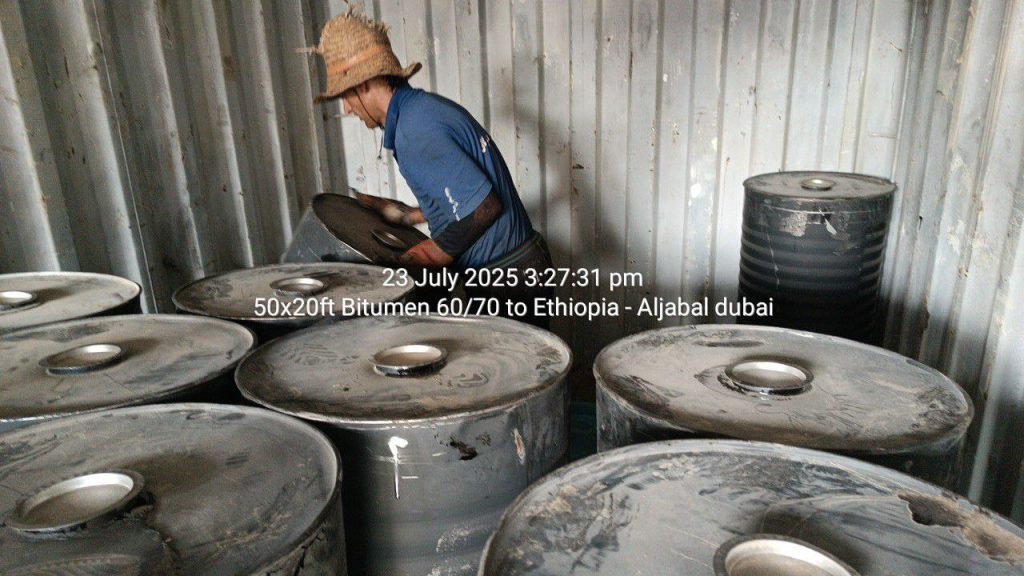
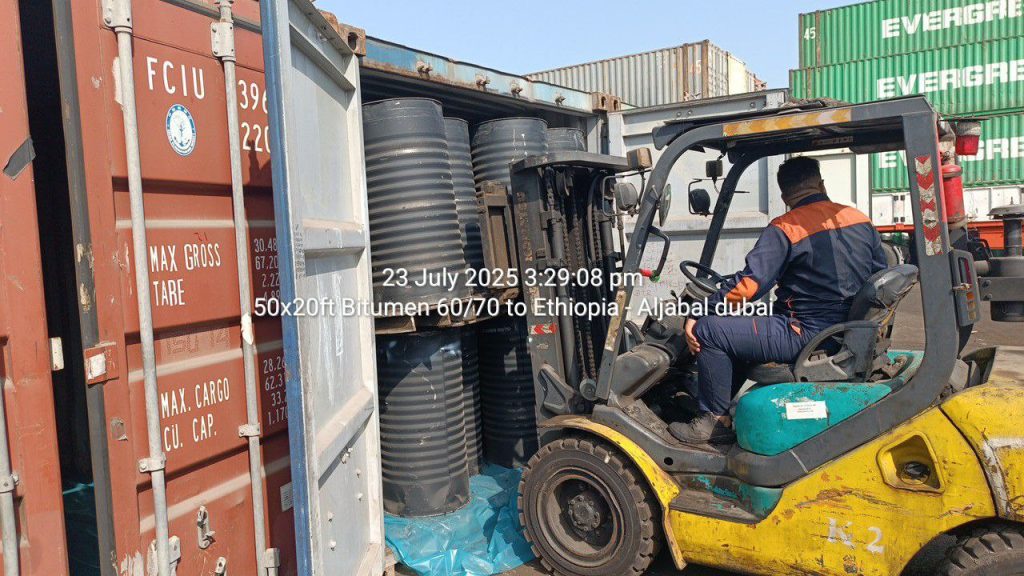
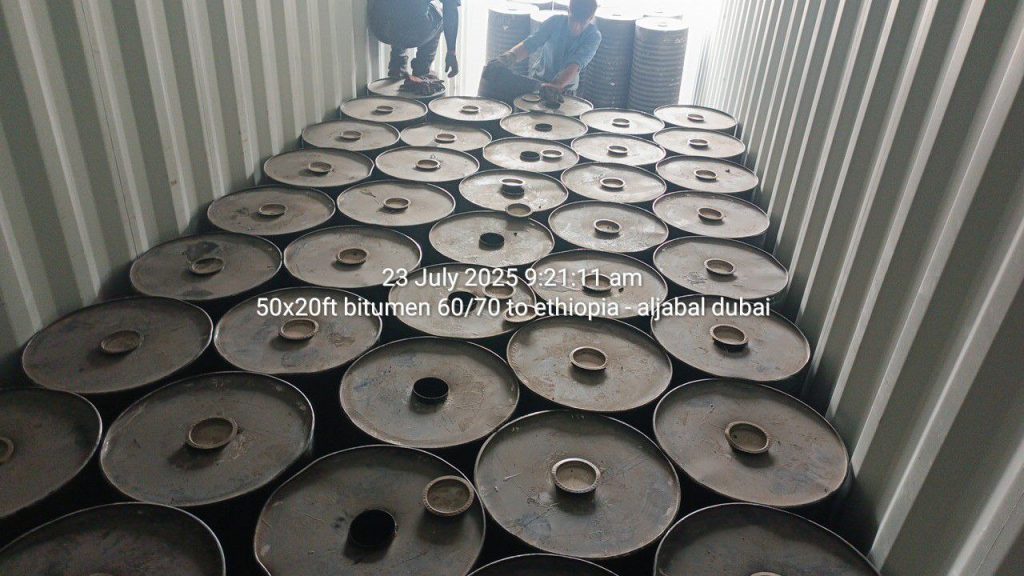
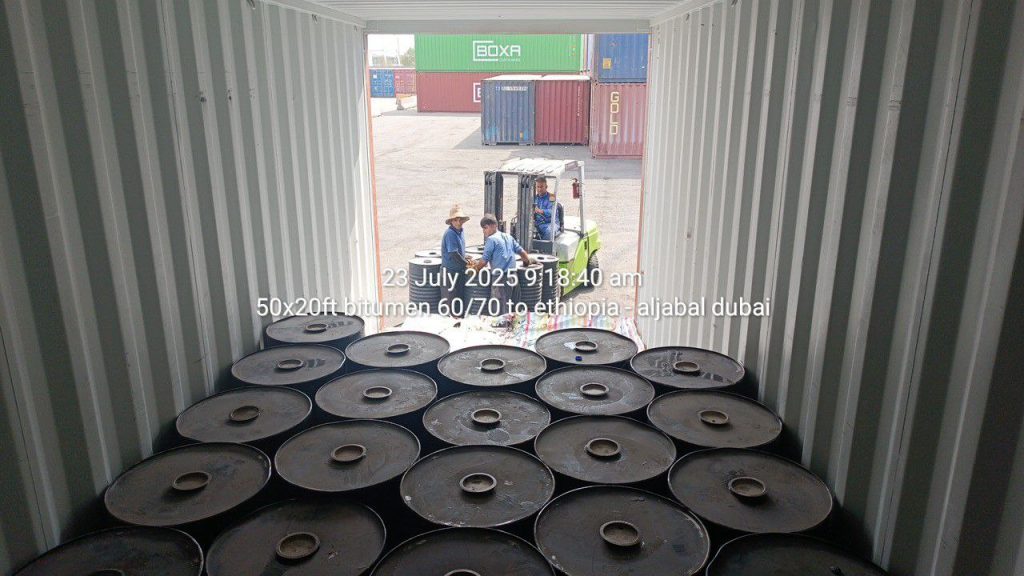
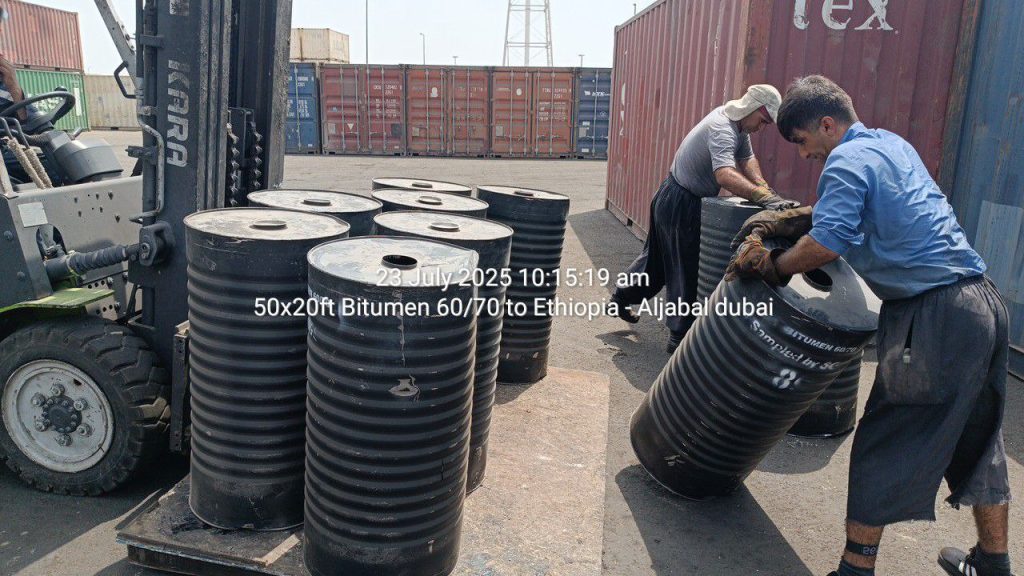
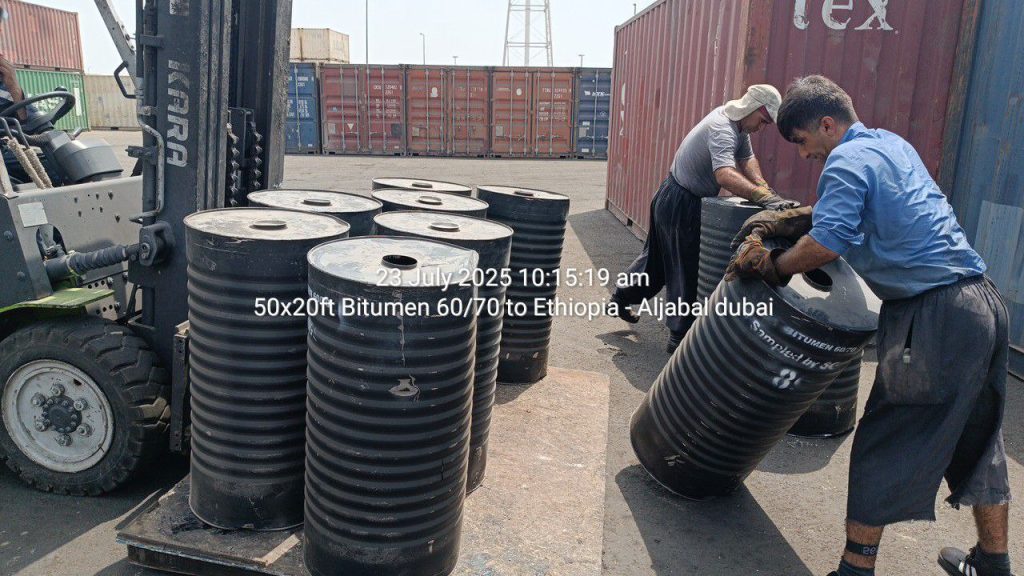

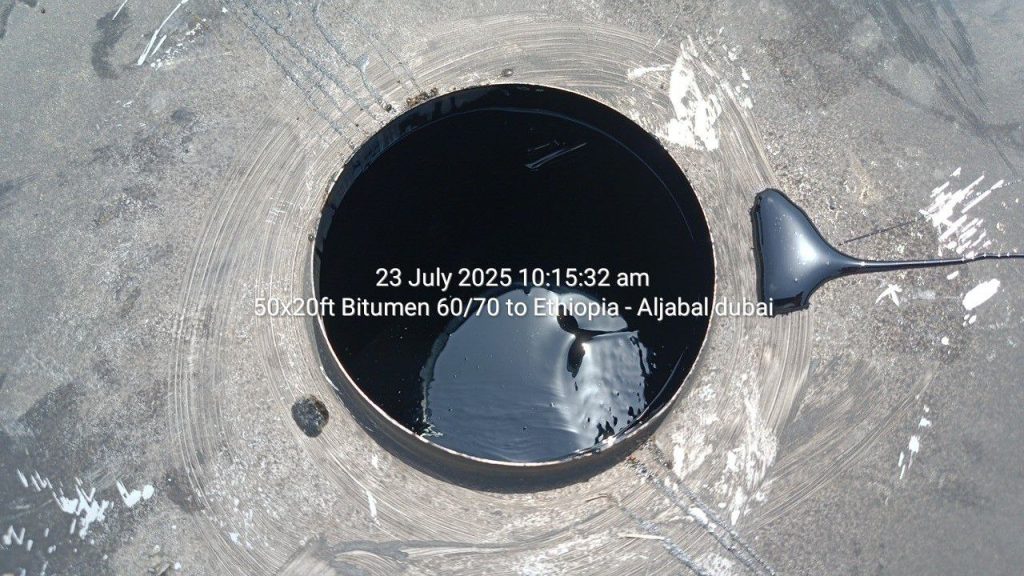
The delivery was part of a government-backed procurement program, aimed at supporting Ethiopia’s massive highway expansion plans. But beyond the numbers, the shipment reflects:
- Confidence in Aljabal Holding’s supply reliability
- Strategic positioning of Ethiopia as an emerging market
- Growing importance of East Africa in global bitumen trade routes
This milestone also proves that Aljabal Holding has the capability to manage not just the supply chain, but also the regulatory and logistical complexities of cross-border trade with landlocked nations.
How Bitumen is Transported in Bulk
Transporting bitumen is no small task. It involves a complex process that ensures the material retains its quality and arrives in perfect condition—especially when you’re moving 50 full containers over land and sea, like Aljabal Holding did in July 2025.
Packaging and Containerization
Bitumen is often transported in one of the following forms:
- Drums or barrels
- Jumbo bags
- Bulk containers with liners
- Bitutainers (specialized tank containers)
For the Ethiopia shipment, Aljabal used 20ft containers, each optimized for secure bitumen transport. These containers were fitted with high-temperature liners and thermal insulation to protect the bitumen during transit.
Temperature Sensitivity
Bitumen must remain within a specific temperature range to stay workable. If it cools too much during transport, it hardens and becomes unusable. That’s why the logistics team ensures:
- Containers are loaded at high temperatures (typically 150°C to 180°C)
- They are well-insulated to retain heat during long hauls
- Unloading facilities in Ethiopia have reheating systems
Multimodal Transport Strategy
Given that Ethiopia is a landlocked country, bitumen typically lands at Djibouti Port and is then trucked into Ethiopian territory. Aljabal’s shipment likely followed this route:
- Sea freight from Gulf production facilities to Djibouti
- Customs clearance and offloading at Djibouti Port
- Land transport via heavy-duty trucks to key project locations in Ethiopia
This seamless end-to-end logistics chain is what makes Aljabal Holding stand out in the bitumen export industry.
Challenges in Exporting Bitumen to East Africa
Moving goods into East Africa, especially in bulk, isn’t without its hurdles. Exporting bitumen to Ethiopia involves navigating a range of challenges—from infrastructure constraints to political and logistical risks.
Landlocked Limitations
Ethiopia has no coastline, which makes dependence on neighboring countries’ ports (like Djibouti and Berbera) inevitable. This introduces risks such as:
- Congestion at port terminals
- High customs duties and clearance delays
- Weather disruptions or road blockages en route
Yet, Aljabal Holding has optimized its supply chain to bypass these challenges efficiently.
Temperature and Storage Risks
Bitumen’s chemical properties make it sensitive to temperature changes. When transporting large quantities across hot and cold zones, it’s crucial to:
- Use thermally protected containers
- Ensure fast offloading to prevent cooling
- Monitor storage conditions in Ethiopia to maintain quality
Aljabal addresses these risks with thermal tracking systems and real-time logistics monitoring.
Regulatory and Bureaucratic Obstacles
Cross-border shipping to Ethiopia involves multiple regulatory bodies, including:
- Ethiopian Customs
- Port authorities in Djibouti
- Environmental and standards agencies
Aljabal Holding’s in-house regulatory compliance team ensures all documentation is pre-cleared, and shipments move without unnecessary hold-ups.
Aljabal Holding’s Role in East African Infrastructure
Ethiopia is just one of many countries benefiting from the company’s focus on supplying critical construction materials.
Long-Term Vision
Aljabal has set its sights on being a key player in Africa’s infrastructure boom. As the continent undergoes rapid urbanization, there’s a massive need for:
- Roads and highways
- Bridges and railways
- Commercial construction
Bitumen is central to all these initiatives, and Aljabal’s consistent supply helps keep projects on schedule.
Collaborations with African Governments
Aljabal works closely with government agencies and local contractors in Ethiopia, Kenya, Uganda, and more. These partnerships ensure:
- Compliance with local standards
- Mutual understanding of infrastructure priorities
- Timely and cost-efficient delivery of materials
By being more than just a supplier, Aljabal positions itself as a trusted partner in development.
Sustainability and Environmental Compliance
Sustainability is no longer optional—especially in construction. Aljabal Holding recognizes the environmental impact of bitumen production and transport and has made key efforts to minimize its carbon footprint.
Eco-Friendly Transport Methods
Where possible, the company uses:
- Low-emission shipping vessels
- Modern fuel-efficient trucks
- Rail networks, when available, to reduce road congestion
Recyclable Packaging
Bitumen is often shipped in recyclable drums or eco-friendly bulk bags, reducing plastic waste and supporting Ethiopia’s push for greener construction practices.
Compliance with Global Standards
All shipments are:
- ISO certified
- Follow IMO and UNEP guidelines
- Regularly audited for eco-compliance
This ensures Aljabal Holding stays ahead in both performance and responsibility.
Economic Impact of Bitumen Imports in Ethiopia
The arrival of 50x20ft containers of bitumen isn’t just a trade event—it has real economic implications for Ethiopia.
Boost to Infrastructure Projects
With the new bitumen stock, several ongoing and upcoming road projects can continue without delays, including:
- Addis Ababa to Hawassa expressway expansion
- Cross-border roads to Kenya and Djibouti
- Upgrades of rural feeder roads
This translates to better logistics, reduced travel time, and economic integration for local communities.
Employment and Industrial Growth
Imports like this spark a ripple effect:
- Job creation in logistics, warehousing, and construction
- Growth of local construction companies
- Demand for auxiliary services like maintenance and equipment hire
Bitumen availability makes it possible for Ethiopian industries to thrive—and that’s the kind of long-term impact Aljabal Holding is proud to be a part of.
Strategic Importance of Ethiopia in Regional Trade
Ethiopia isn’t just a recipient of construction materials—it’s quickly becoming a strategic trade hub in East Africa. With a population of over 120 million and a government eager to invest in infrastructure, Ethiopia serves as a gateway to landlocked countries and the Horn of Africa.
Geographical Advantage
Situated next to Djibouti and near the Red Sea, Ethiopia enjoys:
- Proximity to Gulf suppliers like Aljabal Holding
- Easy access to regional markets
- Road corridors connecting to Sudan, Kenya, and Somalia
By investing in road networks, Ethiopia is laying the groundwork for interconnected trade routes, making it a preferred destination for infrastructure investments.
Government Incentives for Infrastructure Development
The Ethiopian government has prioritized road construction in its national development plan. Incentives include:
- Tax breaks for importers of construction materials
- PPP (Public-Private Partnership) opportunities
- Streamlined customs clearance for strategic imports like bitumen
Aljabal Holding’s involvement is a clear sign that the country is open for business and serious about building up its infrastructure from the ground up.
How This Export Enhances Aljabal Holding’s Market Position
Exporting 50 containers of Bitumen 60/70 is not just a delivery—it’s a statement of market dominance. For Aljabal Holding, the July 2025 shipment to Ethiopia strengthens its reputation and opens doors for future projects across the continent.
Reputation as a Reliable Supplier
In the bitumen industry, timeliness and quality are everything. Aljabal’s on-time delivery to Ethiopia:
- Builds trust with African governments
- Positions them as a priority supplier
- Establishes a track record for reliability in bulk logistics
This milestone becomes a case study that the company can use to win new contracts in Kenya, Uganda, and beyond.
Competitive Advantage Through Logistics Mastery
While many companies can supply bitumen, few can manage the complexities of delivery to landlocked countries at this scale. Aljabal Holding has:
- A strong network of shipping and land transport partners
- In-house logistics experts
- Real-time cargo tracking to ensure quality control
This gives them a decisive edge over competitors.
Customer Satisfaction and Feedback from Ethiopian Clients
Aljabal’s bitumen isn’t just delivered—it’s appreciated. Feedback from Ethiopian project managers and contractors reflects high satisfaction with both product quality and service reliability.
Quality Assurance and Performance
Clients reported:
- Smooth application of bitumen in road surfacing
- Minimal wastage and excellent bonding with aggregates
- Enhanced longevity of asphalt layers due to consistent viscosity
Such outcomes build long-term loyalty and encourage repeat contracts.
Service and Support
Aljabal Holding also offers:
- Post-delivery technical support
- Guidance on storage and reheating protocols
- Emergency delivery services for shortfall coverage
This kind of holistic service goes beyond typical supplier-client relationships—it makes Aljabal a strategic partner in national infrastructure.
Future Export Plans and Regional Expansion
Following the success of the July 2025 shipment, Aljabal Holding is now scaling up operations across Africa. Ethiopia is just the beginning.
Planned Exports to Other African Nations
Countries on Aljabal’s radar include:
- Kenya, with ongoing expressway expansions
- Tanzania, focusing on new highways and ports
- Uganda, which is revamping its national road grid
The company is already in negotiations with multiple ministries of transport and infrastructure, ensuring more bitumen containers are on the way across the region.
Facility Expansion and Local Partnerships
To meet increasing demand, Aljabal plans to:
- Set up regional storage hubs near Djibouti and Addis Ababa
- Partner with local transport and construction firms
- Offer technical training for African clients on bitumen handling
These moves will make it easier to respond to last-minute demands and support infrastructure development at every stage.
Conclusion
The July 2025 export of 50x20ft containers of Bitumen 60/70 to Ethiopia by Aljabal Holding wasn’t just a transaction—it was a powerful demonstration of strategic logistics, market understanding, and international collaboration. Ethiopia’s growing infrastructure needs met Aljabal’s world-class delivery capabilities, proving that when demand and supply align effectively, nations can build faster, better, and stronger.
From ensuring temperature-controlled transport to delivering on tight deadlines in landlocked territories, Aljabal Holding has shown that it can go beyond product delivery—it delivers value, reliability, and growth. With Ethiopia as a case study, the company is now well-poised to lead East Africa’s infrastructure boom through quality bitumen supply and long-term partnerships.
FAQs
1. Why is Bitumen 60/70 used in Ethiopia’s road construction?
Bitumen 60/70 offers optimal hardness and flexibility, making it perfect for Ethiopia’s climate and traffic conditions. It ensures long-lasting, crack-resistant roads.
2. How does Aljabal Holding manage bitumen delivery to landlocked countries?
They use multimodal logistics—shipping to Djibouti Port, then trucking into Ethiopia with temperature-controlled containers and expert customs handling.
3. What makes Aljabal Holding different from other bitumen exporters?
Their strength lies in logistics mastery, consistent quality, and exceptional after-sales support, making them a trusted partner rather than just a supplier.
4. Will Aljabal Holding expand further in Africa?
Yes. They plan to serve Kenya, Tanzania, Uganda, and more through new storage hubs, partnerships, and increased production capacity.
5. How can African contractors work with Aljabal Holding?
They can reach out via the company’s website, regional representatives, or during local infrastructure exhibitions where Aljabal regularly participates.
